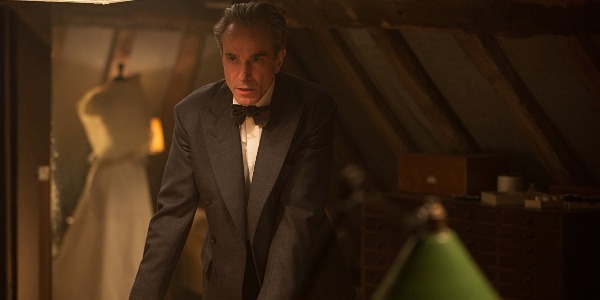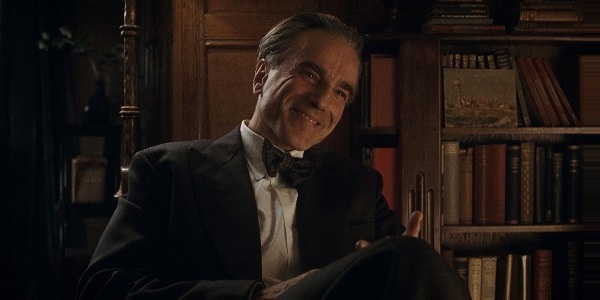PHANTOM THREAD: Stylish, Sumptuous & Quietly Kinky

Alistair is a 25 year old writer based in Cambridge.…
Paul Thomas Anderson’s projects are always shrouded in swathes of secrecy that grants them near mythical status long before anybody finds out what he’s actually making. In the case of Phantom Thread, his sumptuous eight feature, rumours began swirling across the internet months before a trailer was released that despite the appearance as a classy period piece, the then untitled work would be dealing with the subject of kinky sex, with numerous explicit sequences.
These rumours only intensified upon the announcement that Daniel Day-Lewis was to play a character named Reynolds Woodc*ck, a world renowned fashion designer whose professional life gets thrown into disarray with the arrival of a brand new muse.
Thematically rich and knowingly ridiculous
When described in this bare bones manner, Phantom Thread sounds like a deliberate subversion of a Mills & Boon style romance, the nonsensicality of escapist love stories and the people who populate them filtered through a very modern sexual subtext that calls to mind Peter Strickland’s The Duke of Burgundy.
The rumours surrounding Phantom Thread turned out to be largely false, yet in the final product, this incisive examination of the power roles in relationships persists. It’s a film about fetish in the most abstract sense; less preoccupied with kink than the mere idea of domination and submission, and how the ever-changing positions of power can grow to obscure the initial feelings you once had for your partner. It might not be Anderson’s best film, yet it is undoubtedly one of the most thematically rich films he has ever put his name to.

In the early 1950’s, fashion designer Reynolds Woodc*ck (Day-Lewis) and his sister Cyril (Lesley Manville) operate the world renowned Woodc*ck label, designing dresses exclusively for high society, be they film stars or members of the royal family. Reynolds has never married, changing romantic partner with each calendar year, and after being urged by his sister to leave a partner that has gotten “too fat”, decides to head off for a break at the seaside.
At his hotel, he spots waitress Alma (Vicky Krieps) and immediately becomes infatuated – he takes her back to his place to take her measurements, and she soon becomes his muse. Unfortunately for Reynolds, she is not suited to his meticulously planned lifestyle that leaves no time for spontaneity or conventional romantic happiness. More importantly, she is less submissive than the partners he is used to, something which starts to throw his professional life into disarray.
Day-Lewis has threatened to retire from acting before and once again, he has claimed that Phantom Thread will be the final performance of his career. It’s not a typically showboating final performance like you’d expect from an actor planning for retirement either. Instead, the only pomposity comes from the character itself. Reynolds Woodc*ck is a pompous, pretentious and generally insufferable twit that both Day-Lewis and Anderson are having the time of their lives depicting. It’s a keenly observed comic performance, slotting nicely into the lineage of British comedy characters with an over-inflated sense of self-importance that runs from John Cleese’s Basil Fawlty to Steve Coogan’s Alan Partridge.
Phantom Thread’s rich thematic undercurrents ensure the film refrains from ever being perceived as an out and out comedy, yet in this character focused satirisation of toxic masculinity at its most extreme, the director and star pull out all the stops to make you laugh at this character’s appalling behaviour and sheer idiocy. The comparison to Alan Partridge isn’t an entirely unfounded one either; multiple lines of dialogue would sound perfect spilling from that character’s mouth, most notably Reynolds Woodc*ck claiming that the person who invented the word chic “deserves to be spanked in public”.

Another reason why it’s strange to see Day-Lewis retire with this performance is that he’s completely acted off screen by his female co-stars- something which could be seen as a meta commentary fighting back against his character’s boorish behaviour. As Alma, Vicky Krieps gives one of the year’s finest performances, and her most prominent film performance to date. It will take multiple viewings of the film to fully appreciate the complexity of Krieps’ performance when it comes with her portrayal of holding both sides of the power dynamic within her relationship.
A deceptively simple portrayal of domestic unease
The film’s final moments (which I will refrain from even alluding to, let alone spoiling) further complicate the depiction of the central relationship’s power dynamic and underlying fetish for submission – it’ll make you want to watch the film again immediately to analyse character details at a greater depth, as well as making you think twice about whether Phantom Thread can be simply described as a “toxic masculinity movie”.
That she nails the complexity of the role while managing to become the human, moral centre of a film depicting a heartless industry is a significant achievement. The role is a more grounded equivalent to that of Juliette Binoche in Abbas Kairostami’s Certified Copy, another film whose strength comes from allowing the audience to interrogate the power dynamics of a central relationship at their own will.
That Phantom Thread is so thematically and performatively dense while maintaining a comedic lightness of touch is one of Anderson’s greatest achievements; on repeat viewings, it seems likely that this will grow to become one of the better entries in his filmography. If anything, this feels like a film he’s been thematically working towards his entire career.
Tom Cruise’s misogynist pick-up artist in Magnolia offered his fans relationship tips that Reynolds Woodc*ck appeared to have pioneered decades earlier, while Day-Lewis and Anderson’s previous collaboration There Will Be Blood explored the theme of a man becoming corrupted by success, an identical central theme to the one examined here.

However, Phantom Thread’s core idea of a relationship with unclear dominant and submissive roles has most nakedly been hinted at in Anderson’s earlier flirtation with offbeat comedy, 2002’s under appreciated Punch-Drunk Love. In this earlier film, Adam Sandler plays a downtrodden man ridden with anger and regularly emotionally abused by his female siblings. When he finds love, it is orchestrated entirely by a friend of his sister’s (played by Emily Watson), whom the film frequently hints is manipulating him in to a relationship – when she is first glimpsed, she’s out of focus and following him around a grocery store.
This idea was left to simmer in the background and is dealt with in a playful, borderline flippant manner. However, it’s do deeply ingrained in this earlier effort, that it’s hard not to see Punch-Drunk Love as the real companion piece to Phantom Thread. Even the abrasive sound design in his latest effort, mostly used to comic effect whenever Reynolds hears Alma buttering toast too loudly, appears to be calling back to the aggressive sound of Barry angrily smashing up windows and toilet cubicles in Punch-Drunk Love.
Phantom Thread: Conclusion
Phantom Thread may be Anderson’s first film set outside of the USA, yet it slots perfectly into his filmography. Upon first viewing, it’s utterly irresistible, but the dense themes and examinations of inter-character relationships means that it is the rare Anderson effort that will only be upgraded to masterpiece status once it has fully been processed after multiple viewings.
In a career of wall to wall masterworks, what is Paul Thomas Anderson’s best film?
Phantom Thread expands to wide release in the US on January 19th, and is released in the UK on February 2nd. All international release dates are here.
Does content like this matter to you?
Become a Member and support film journalism. Unlock access to all of Film Inquiry`s great articles. Join a community of like-minded readers who are passionate about cinema - get access to our private members Network, give back to independent filmmakers, and more.
Alistair is a 25 year old writer based in Cambridge. He has been writing about film since the start of 2014, and in addition to Film Inquiry, regularly contributes to Gay Essential and The Digital Fix, with additional bylines in Film Stories, the BFI and Vague Visages. Because of his work for Film Inquiry, he is a recognised member of GALECA, the Gay & Lesbian Entertainment Critics' Association.













